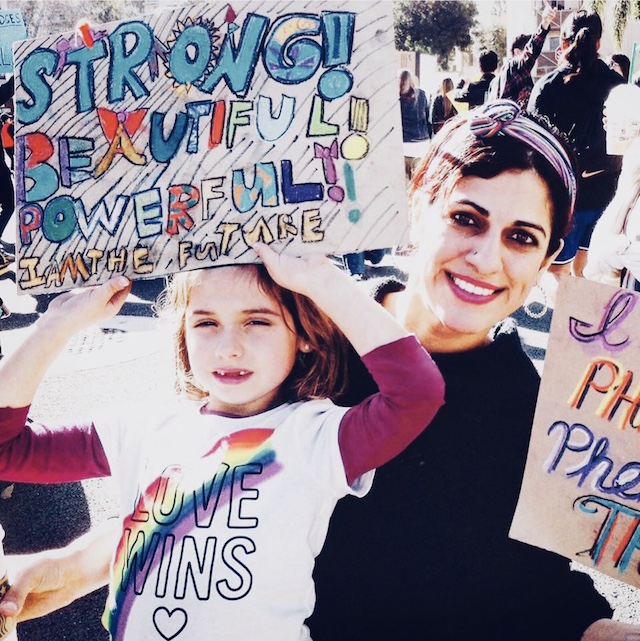Pussy, Nasty Girl, and Pasties: Upside-Down Feminism.
“Mommy, why does that girl have a sign that says ‘pussy’ on it? Why does she look naked with those Xs on her chest? Why does that lady have a shirt that says she’s ‘nasty’?”
I remember every muscle in my body tensing and my body temperature rising as I felt increasingly anxious trying to answer my seven-year-old’s questions during the Women’s March.
While I was proud to participate in such a powerful movement with my daughter and had taken the time to explain the importance of women’s rights to her, I found myself increasingly nervous about the way feminism was being portrayed to our children.
Since then, I have frequently wavered in my sentiments regarding this matter and have even been accused of not being a “true feminist” by pseudo-feminists because of my preferences in my expressions, my role in relationships, and partially conservative take on parenting.
After months of taking a step back to self-reflect, intently observing this new wave of women’s empowerment, and talking to various men and women in my life, I gained a deeper understanding of the relativity of feminism in the United States and what it means to me.
By definition, feminism is “a range of political movements, ideologies, and social movements that share a common goal: to define, establish, and achieve political, economic, personal, and social equality of sexes. This includes seeking to establish educational and professional opportunities for women that are equal to those for men.”
By that definition alone, I proudly declare myself as a feminist.
Growing up as a Middle Eastern girl in a predominantly Christian town, I was constantly at war with myself, battling my identity, and trying to find a sense of autonomy in a misogynistic world. I frequently made it a point throughout my childhood to express myself openly, prove I could do what boys could do, and was determined to move against the traditional expectations of what defines a woman.
I was proud to be a “black sheep” and eventually mustered enough strength and self-worth to walk away from unhealthy relationships, advocate for all human rights, complete higher education, start my own organization, and thrive to the best of my ability as a single mother.
But despite my progressive political views and accomplishments as an independent woman, there has still always been a more “traditional” side to me that seems to ruffle some feathers. The part of me that seemingly and openly enjoys chivalry, melting in the arms of a masculine man, staying home with my child, making family meals, and taking on the role of a homemaker. Somehow these preferences in 2018 seem to allude to being inferior to a man in some way, when the fact is, there is so much empowerment in knowing who I am and choosing what I want in my life.
There is also a part of me that just isn’t comfortable throwing around (what I find to be derogatory) terms, like “pussy bites back” or “nasty girl,” to define my beliefs on women’s equality.
These are terms I don’t wish to become desensitized to, and I often wonder why we haven’t found better ways to articulate our expressions in ways we’d be comfortable with our children expressing.
There is a part of me that believes in the beauty and sacredness of the female body, but also believes it can be praised and honored without using public nudity to make a political statement.
There is a part of me that wants everyone to be comfortable with their own body and sexuality, but fears that the over-sexualization in these women’s empowerment movements can potentially send the wrong message to young girls today.
Does all of this make me less of a feminist? And if so, what does a true feminist look like, behave like, speak like?
As I watch this powerful movement of women rising up throughout the world, my hope is not to shame, judge, or ridicule anyone’s choice in self-expression; in the same way I don’t wish to be shamed, judged, or ridiculed for mine.
Rather, my hope is to shine light on the perspective of women who may not fit the mold of what a modern-day feminist “should be,“ and open dialogue about what type of example we want to set for future generations.
Perhaps it’s time we bridge the gap between what feminism looks like on the surface, and what it really means at its core. It’s not about normalizing or appropriating overtly sexual behavior. It’s not about man hating, superiority, or gaining power. It’s not about jumping on the bandwagon of a new trend of marches for publicity or social gain.
Feminism is supposed to be about equality, acceptance, and unity.
It’s about rising up together, rather than tearing each other down—and if our hope is to raise a strong new generation of young women, we have to be mindful of the footsteps we are leaving behind for them to follow.
Author: Yeggi Kaela Watts
Image: Author’s own
Editor: Sara Kärpänen
Copy editor: Yoli Ramazzina











Read 2 comments and reply